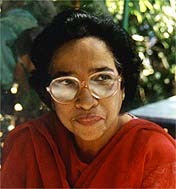The Clara Swain Hospital at Bareilly stands as a tribute to the perseverance and dedication of
Clara Swain, the first woman physician who came to India. She was to provide
quality medical care for women secluded in the zenana. This institution is now
a famous multi-specialty hospital providing Integrated Health Care to thousands
of people. Not many of the patients who come here are aware of the pioneering
work of a young American woman, who goaded by her faith and zeal for service,
answered the call for a female doctor to work in a village called Bareilly.
This was in the mid-19th
century when one missionary described “India as the land of breaking hearts.”
Women were shrouded in purdah, with no exposure to education and no access to
medical care. Male doctors could not attend on women. Women lived their lives
in seclusion and could speak only to male relatives. Both maternal and infant
mortality was high. Child marriage was the practice and female infanticide was
common.
Clara Swain was
ignorant of the cultural shock that awaited her. Her religious fervor and
missionary zeal can be aptly described in the words of Browning. “All service
is the same with God, whose puppets best and worst are we. There is no last nor
first.”
Clara was born in
Elmira, New York on 18th July, 1834. Brought up as a Methodist by
very religious parents, she was attracted to a Christian profession. She
completed her religious studies by the age of 21. But soon after, she developed
an interest in caring for the sick. She spent the next three years working with
a physician called Cordelia Brown. Now she was convinced that Medicine was her
calling. She enrolled at the Medical College in Pennsylvania and graduated in
1869, at the age of 35. In November that same year, she left for India.
The voyage from New
York to Bombay was a horrible experience. The weather was stormy and she was
sea-sick for most of her journey.
“I cannot bear to think of the sea,” she moaned, “It
has treated me badly.”
Neither was her landing in Bombay exciting. Her
means of transport was a horse-driven carriage called dak gari. The long journey to Jubalpore by road was exhausting,
especially as she was at the mercy of a temperamental horse, which would
sometimes squat and refuse to budge. With no knowledge of the local language
and no proper food, it was an awful journey. From Jubalpore to Cawnpore she
took a train. But the last stretch to Bareilly was again by dak gari. After a journey that took
almost two months, she reached Bareilly in January 1870. Her luggage and
medicines did not arrive until one month later.
Clara
was deluged by patients from the very first day. Though her packet of medicines had not
arrived, she had to make do with what was locally available. It was difficult
to maintain segregation of Hindu, Muslim and Christian patients in her small
dispensary. In her first month she had
examined three thousand patients.
Clara
decided to approach the Nawab of Rampore to sell her a piece of his land. It
was a bold gesture for an unveiled woman to travel sixty miles to meet a Muslim
Nawab. The Nawab had sworn that he would never allow a Christian missionary
inside his city. He kept her waiting for a whole day. Then to her surprise and
delight, he donated 42 acres for her project. It contained a large house,
gardens and wells.
“Take it,” he said, “It is yours. I give it to you
with great pleasure for such a purpose.”
Clara
moved into the Nawab’s property on 1st January 1872. Two years
later, a hospital for women was opened. It was the first women’s hospital in
all of Asia and was patronized by women from princely families. They made
generous donations towards the upkeep of the hospital, which came to be known
as the Palace of Healing. Women came from other states as well, even from as
far as Burma. The hostility towards western medicine was gradually fading. The
Nawab also permitted her to open a school for girls on his property.
Clara
trained local women to assist her in her work. Her first batch had 14 students.
She taught the basics in anatomy, physiology and simple medicaments. They
became proficient in compounding and dispensing. When sufficiently trained they
appeared for the “Examination of 4th grade doctors.” Two civil
surgeons and an American physician were the examiners. Successful candidates
were given a “Certificate for practice in all ordinary diseases.”
In 1890, the school was upgraded to provide
formalized medical training instead of basic training. It was now called the
Christian Medical College, Ludhiana.
Clara often fell ill due to ill-health and
overwork. She had to go back to the States periodically for treatment. Now
there were other trained personnel to run the hospital. When her health
declined, she accepted an offer to become the personal physician of the Rani of
Khetri. She held this position for ten years. It gave her the luxury of living
in her own house close to the palace, with a small dispensary attached. Her
assignment with the Royal family ended in 1895.
Clara
lived for 25 long years in India. There were no precedents to the kind of work
she was doing among women. It was a combination of Medicine and Evangelism. She
chose career over marriage, leading the way for professional women to achieve
fulfillment outside the institution of marriage.
This
woman who went for home visits on the back of an elephant, lived an exciting
life. But there were moments of fear too and close brushes with death on her
elephant rides. Once, she was about to be washed away in a flood.
Clara
tackled social issues like female education, purdah and its disadvantages and
female infanticide. She trained women in hygiene and fought to increase the age
of marriage for girls. Her work stimulated interest in women’s medical
education.
Clara
retired at the age of 61. She died in New York on Christmas day in 1910. She
was 79 years old. Her poor health was due to overwork and many privations she
suffered in India. But she will always be remembered for her ministry of
healing and the concern for the spiritual well being of her patients.







No comments:
Post a Comment